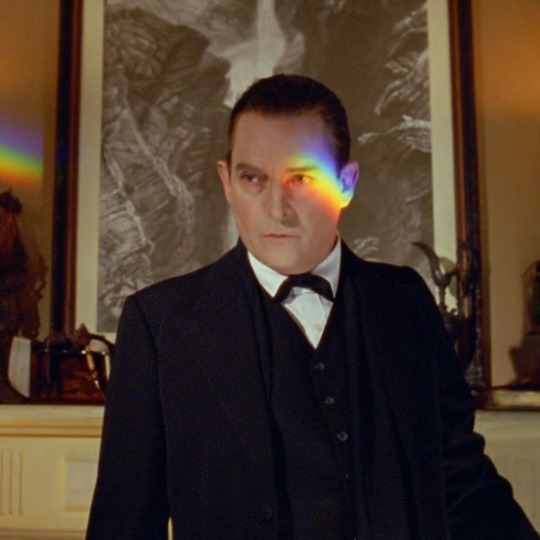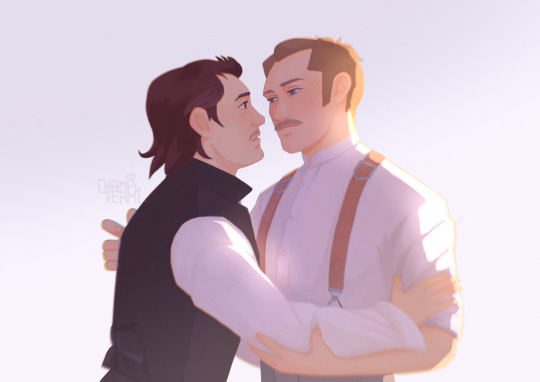Text
Hi guys I'm about to be cringe for a sec under the cut

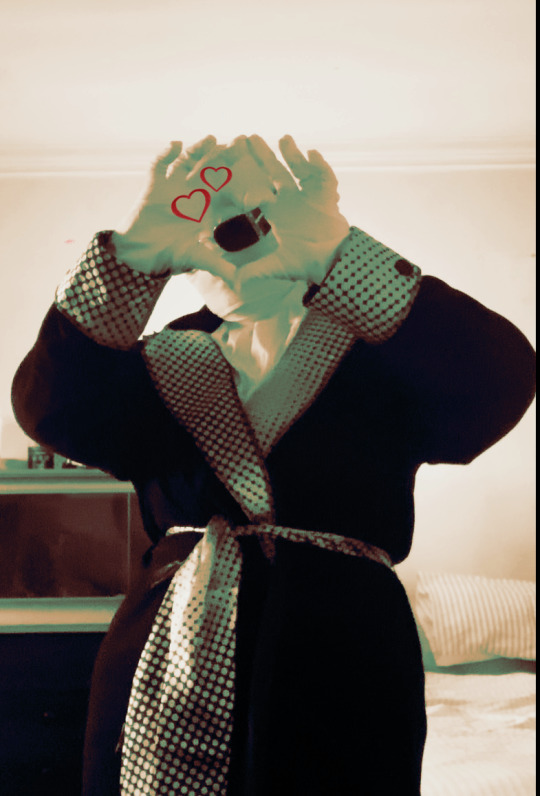
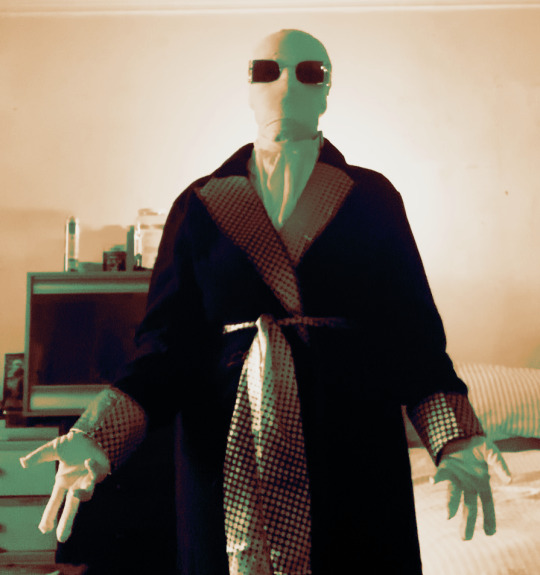
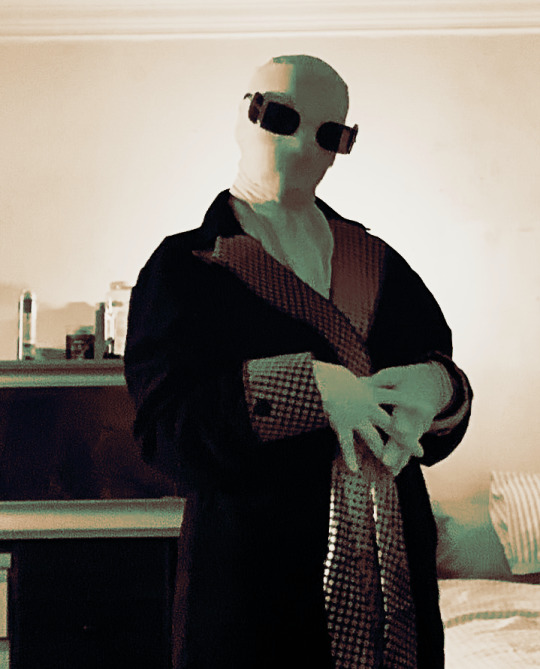
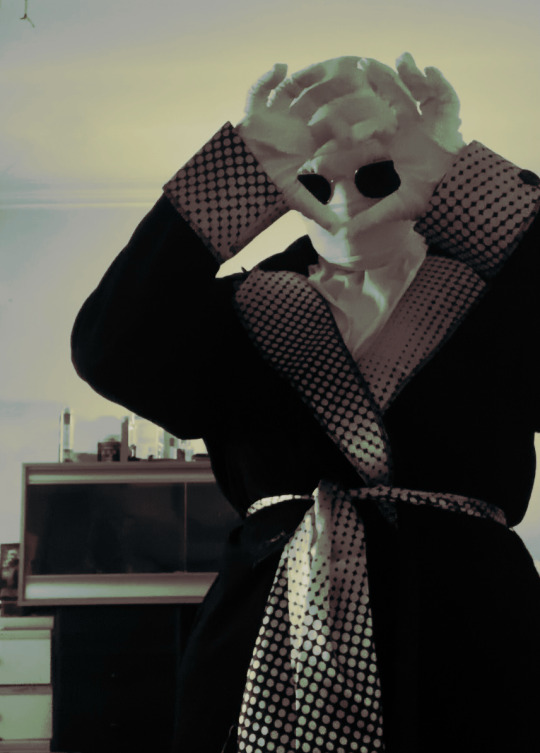
#the invisible man#cosplay#griffin the invisible man#no this is so cool!#ahhh that robe is beautiful#love the personality in those shots too#<3
74 notes
·
View notes
Text
Guess who's making another animatic !!
and this time is local (invisible) menace's time: Griffin !!
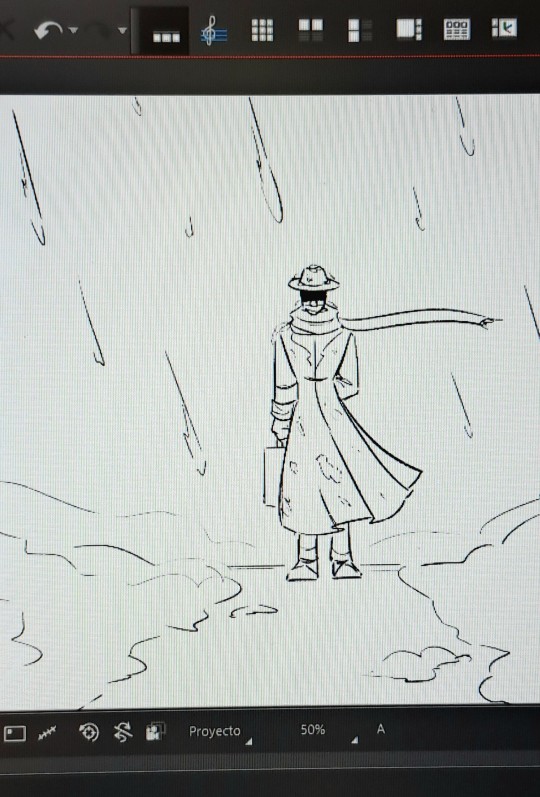
“The stranger came early in February, one wintry day, through a biting wind and a driving snow, the last snowfall of the year, over the down, walking from Bramblehurst railway station, and carrying a little black portmanteau in his thickly gloved hand.”
This brief introduction of Griffin, the invisible man will be updated during the end of this week. It will be a (highly) dramatized version of the beginning of the book. I hope y'all like it when i post it !! ♡
#bouncing in my seat#looking forward to this!!!!#the invisible man#griffin the invisible man#h g wells#invisible man
16 notes
·
View notes
Text
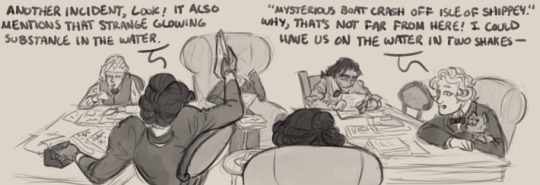
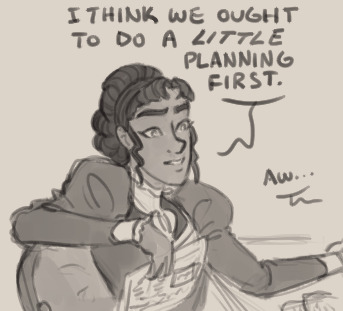
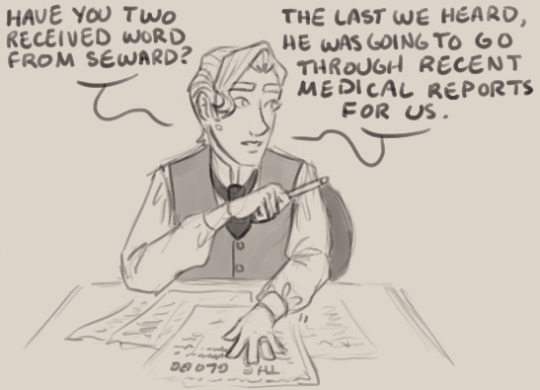
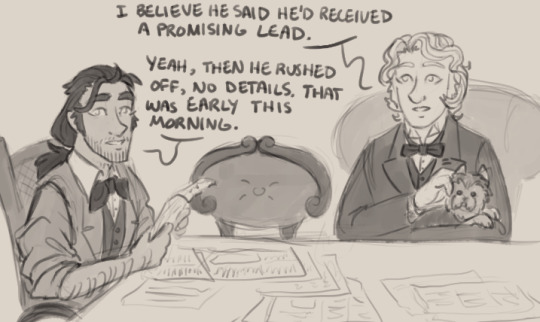
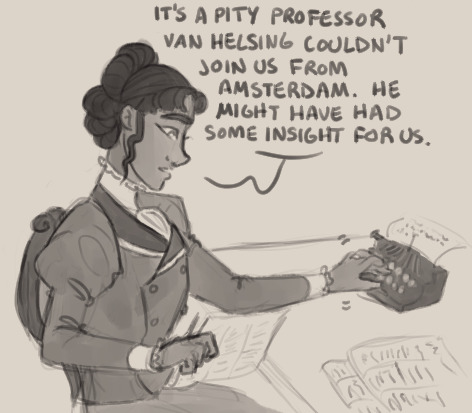
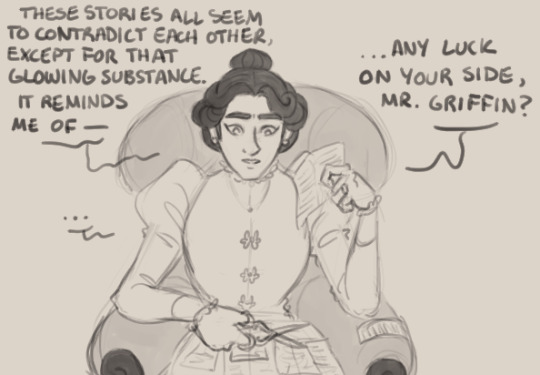
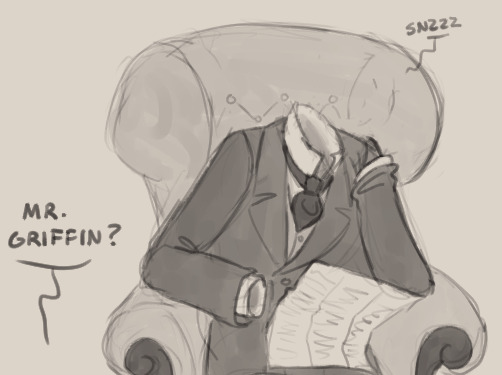
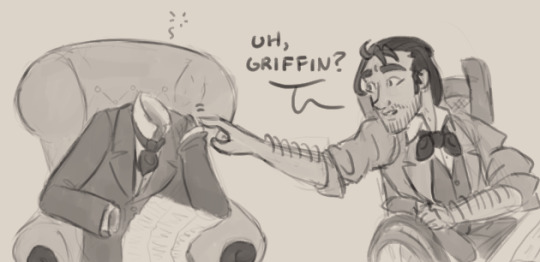
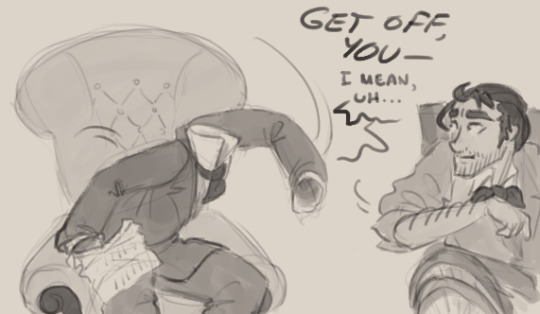
Credits for Episode 2:
Art by @mayhemchicken-artblog
Script by @linguisticparadox and @dathen
Edited by @thegoatsongs, @mrpinniped, and @mayhemchicken-artblog
Sensitivity reads by @pop-goes-the-weasel, @thegoatsongs, and @devilswalkingstick
Image descriptions (alt text) by @thegoatsongs, @dathen, and @mayhemchicken-artblog
Previous page || Next page
Start reading Episode 1
Dialogue transcripts:
Panel 1
Mina: Another incident, look! It also mentions that strange glowing substance in the water.
Arthur: “Mysterious Boat Crash Off Isle of Shippey.” Why, that’s not far from here! I could have us on the water in two shakes—
Panel 2
Mina: “I think we ought to do a little planning first.”
Arthur (offscreen): “Aw…”
Panel 3
Jonathan: Have you two received word from Seward? The last we heard, he was going to go through recent medical reports for us.
Panel 4
Arthur: I believe he said he’d received a promising lead.
Quincey: Yeah, then he rushed off, no details. That was early this morning.
Panel 5
Mina: It’s a pity Professor Van Helsing couldn’t join us from Amsterdam. He might have had some insight for us.
Panel 6
Irene: These stories all seem to contradict each other, except for that glowing substance. It reminds me of— …Any luck on your side, Mr. Griffin?
Panel 7
Irene (offscreen): Mr Griffin?
Griffin: snzzz
Panel 8
Quincey: Uh, Griffin?
Panel 9
Griffin: GET OFF, YOU—I mean, uh…
204 notes
·
View notes
Text
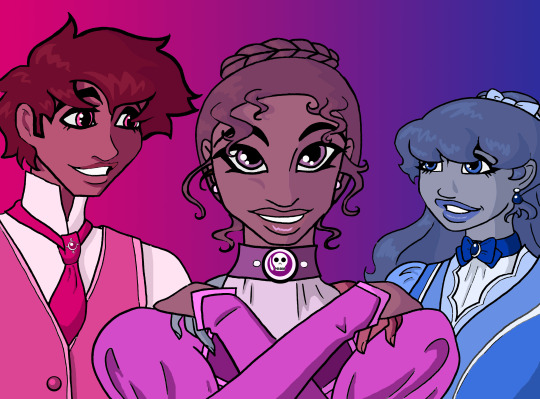
My favorite gothic horror trio celebrating Pride before a certain undead ba(t)stard happens to them <3
If you're interested in some art of your own, I have a Ko-Fi here!
66 notes
·
View notes
Text
The Secret of Sherlock Holmes bookbinding project!
I've really wanted a hard copy for a while of 'The Secret of Sherlock Holmes' play by Jeremy Paul, which was performed by Jeremy Brett and Edward Hardwicke (and is very high on my list of things to go and see if I get a time machine, because there aren't any video recordings of it.)
ANYWAY it's long out of print and very expensive to buy so I figured... I can just make one myself!
First I bound the text block. It's so slim, at a grand total of 75 pages.
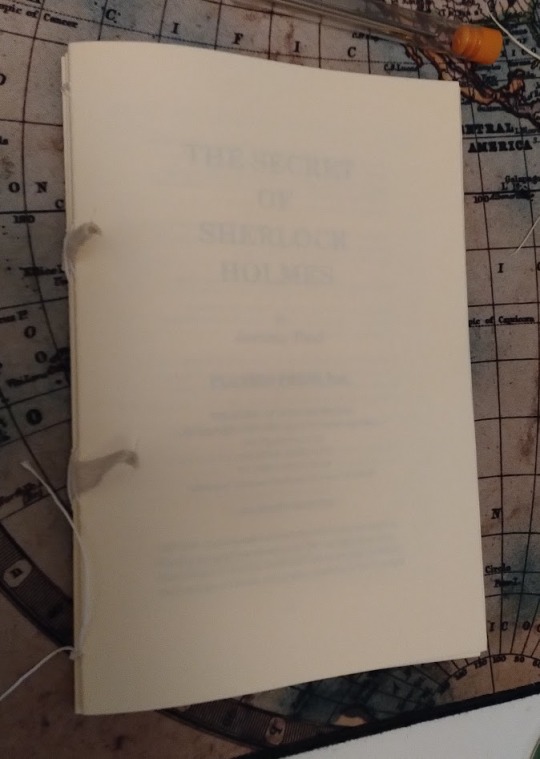
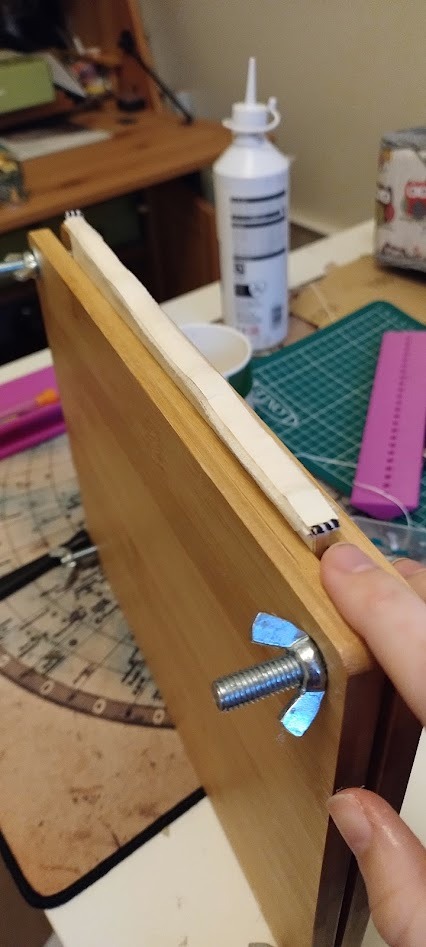
I bound the cover in honey-coloured book cloth, and then set about creating a cover design.
I wanted to use the official logo of the play and this amazing publicity photo, so I went into my paint package of choice (clip studio) and tweaked the photograph until I was happy I'd got a likeness of the actors only using black and white. I think Jeremy Brett lost a little of his handsomeness, alas.
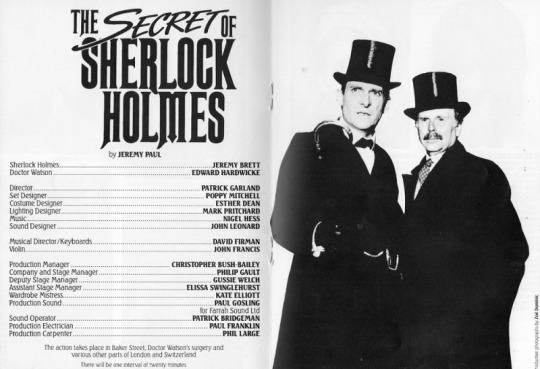
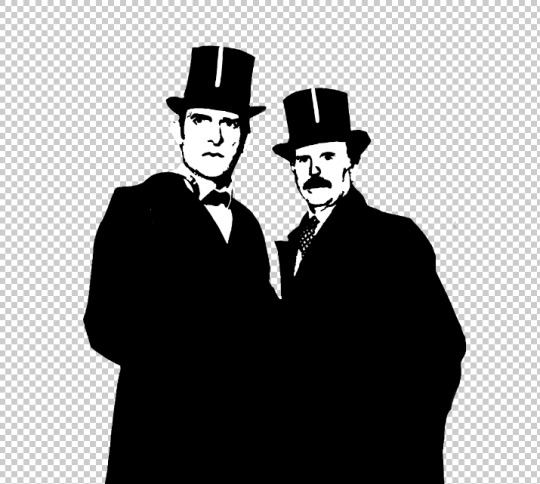
A while ago I bought a cutting machine, a Silhouette Portrait, which comes with some great software which can automatically convert an image like this into a path for the cutting machine to follow, although I usually tweak it manually too.
For example, I figured the weave on Hardwicke's tie was too intricate so I removed it.
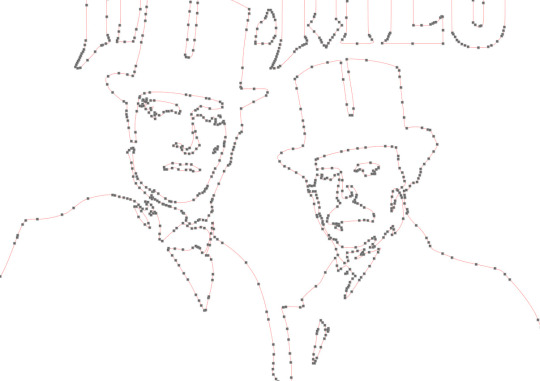
Then I set the cutting machine to work!
For a while I tried using self-adhesive vinyl to make covers, but I found that it wasn't very hard-wearing and would start peeling off. These days I use self-adhesive vinyl to make a stencil, and then paint onto the book cloth in acrylic. The fact that the stencil is self-adhesive reduces the chances of any paint sneaking in underneath!

(The stencil is gold just because I have a lot of spare gold vinyl - it's probably not the best colour to use.)
For this project I did something I've never done before, which is doing two layered stencils, a white layer underneath, and then a black layer on top.
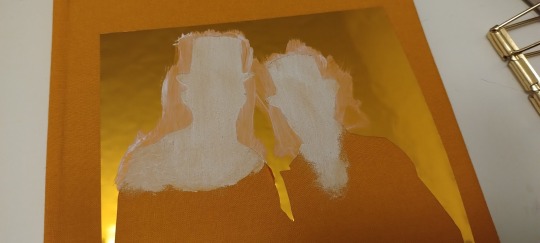
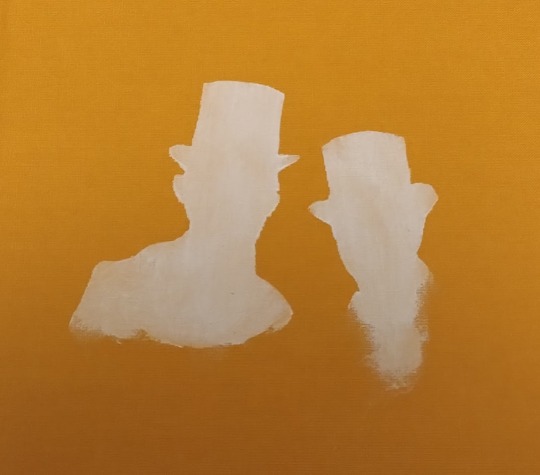
I kind of regret not painting all of the figures in white because if you squint you can see the line where the white stops on the final piece.
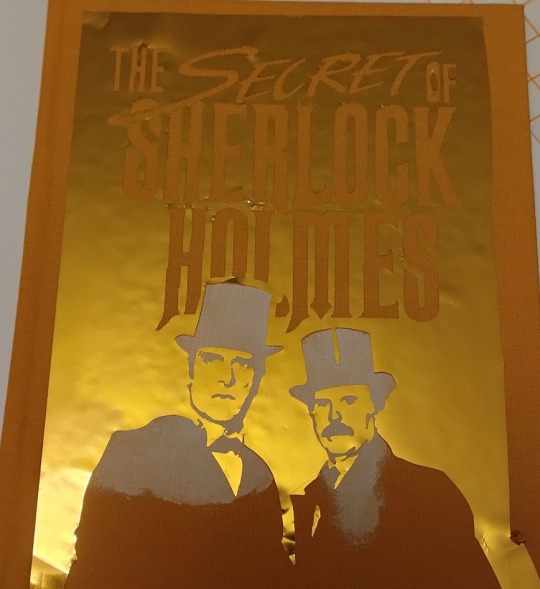
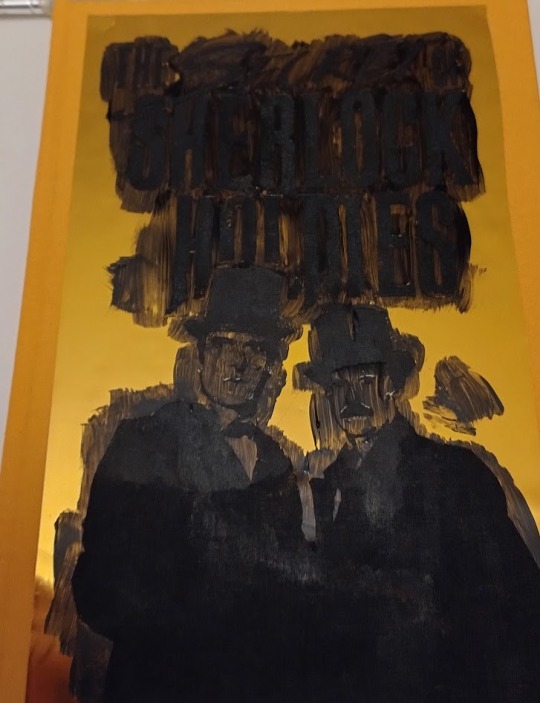
And now for the really satisfying bit - peeling of the stencil when everything has dried!
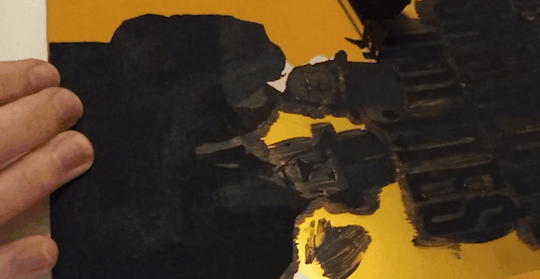
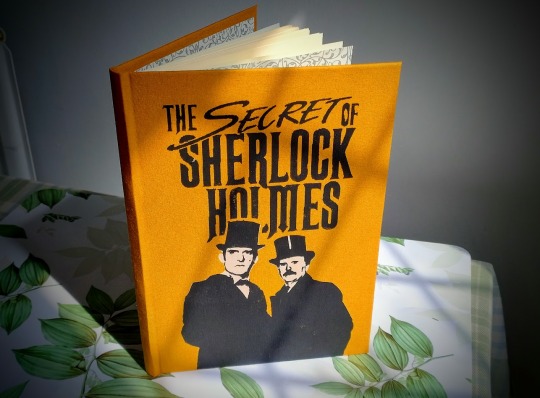
I'm really pleased with the finished book, and it's so fun to possibly have the only hardback version of this play... ever...???

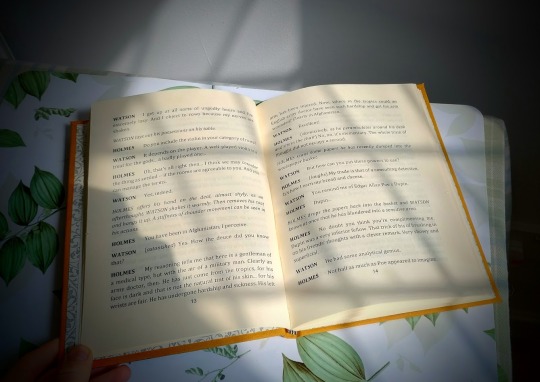
334 notes
·
View notes
Text
If anyones interested in learning about the first black vampire short story, published in 1819, heres a link to the wiki, its called The Black Vampyre, and its about a former slave turned vampire who seeks revenge on his slave master. Its actually a first in many categories!
42K notes
·
View notes
Text
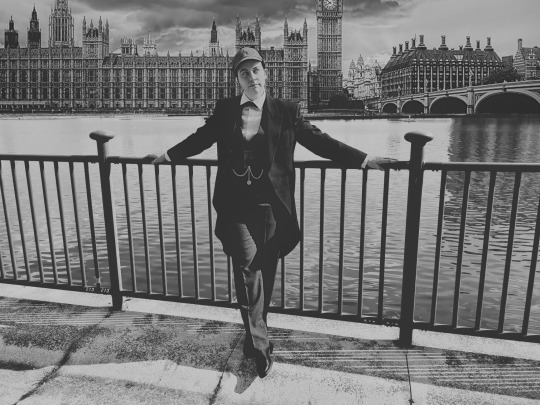
And seeing Holmes in London...he walked up to me carrying our luggage, as he will insist on doing, every step sure and catlike, and I wondered if London spends its every waking moment keening for him, howling for the return of its crown prince. He belongs to London, and he left it behind. For me. Were I London, I should not soon forgive myself, stealing him away in such a fashion.
'Hymn to the Endlessly Falling', Katie Forsythe
45 notes
·
View notes
Photo
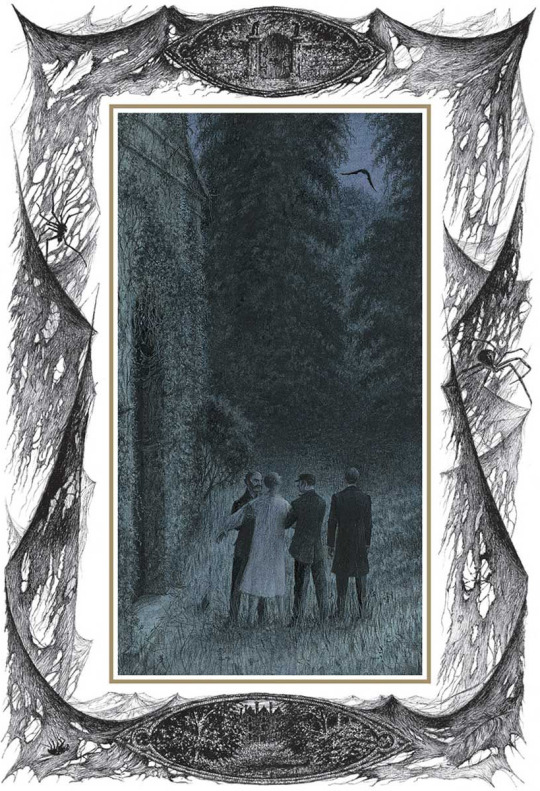
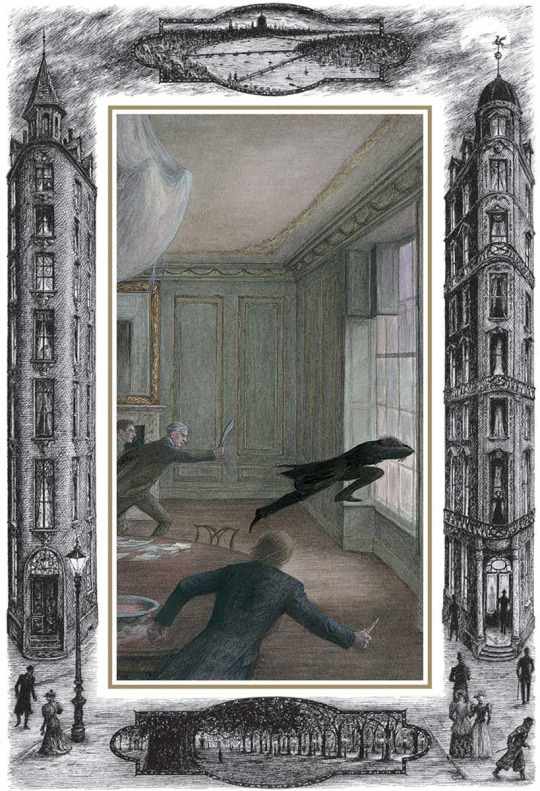
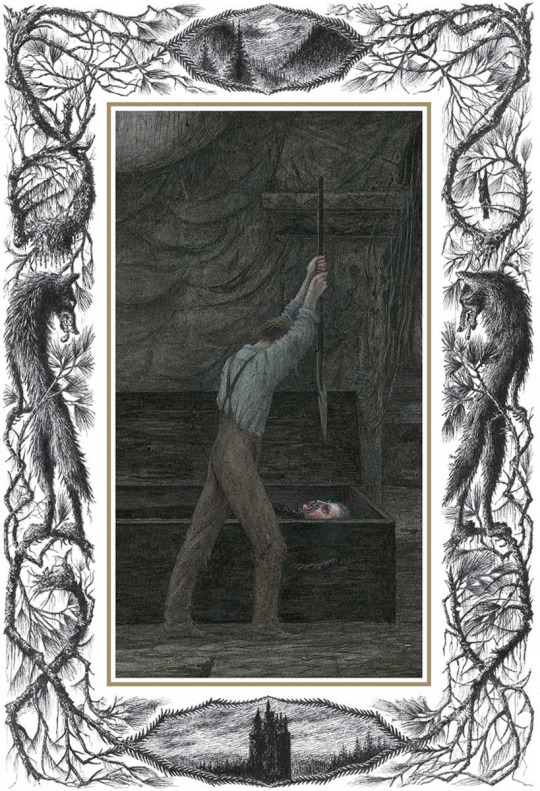
Angela Barrett’s illustrations for Bram Stoker’s Dracula.
3K notes
·
View notes
Text
disney concept art: the most beautiful dynamic original thing i have ever seen
disney finished project: rubber same face minimalism regurgitated plots
356K notes
·
View notes
Video
if you’re having a bad day, here’s a cute little marching band
906K notes
·
View notes
Text
Reblog if you think fanfiction is a legitimate form of creative writing.
442K notes
·
View notes
Text
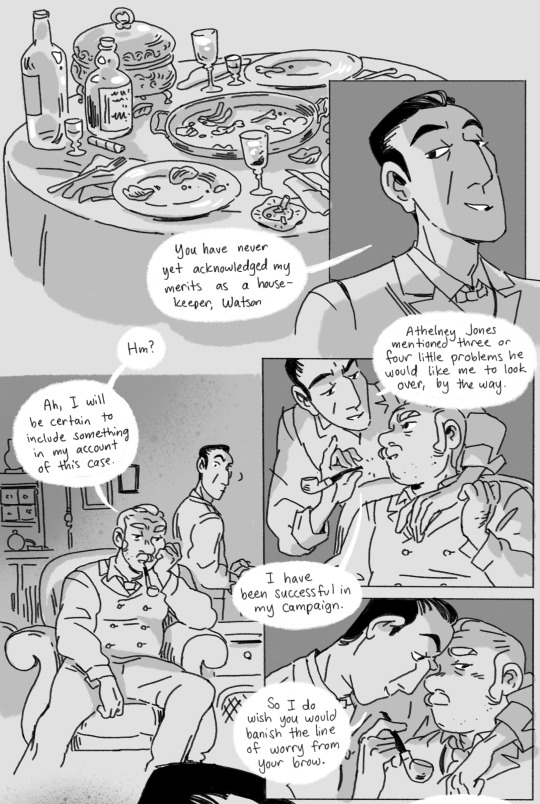
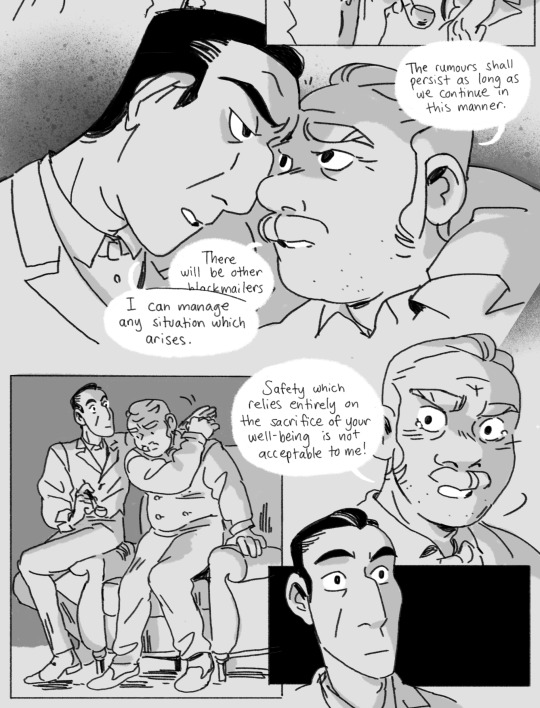

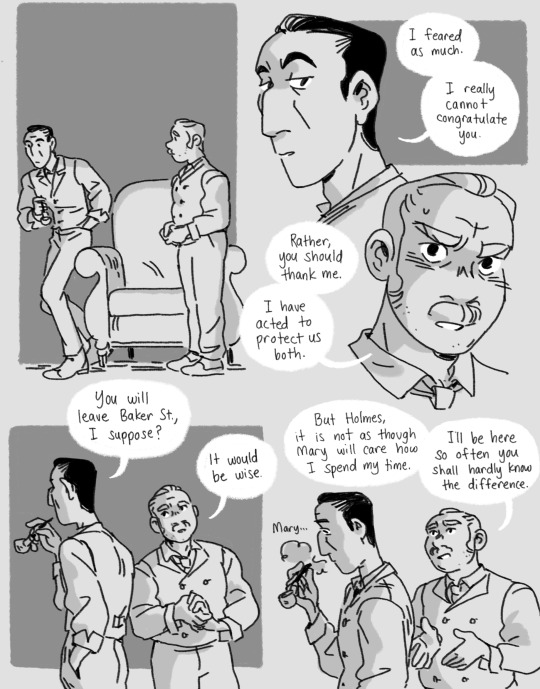
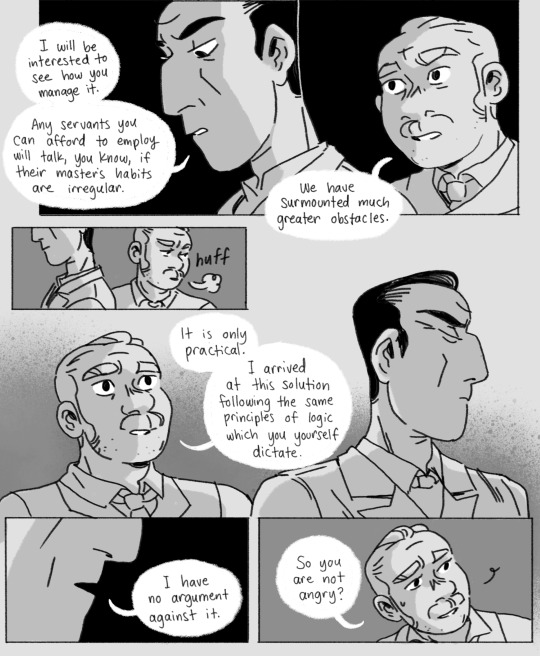
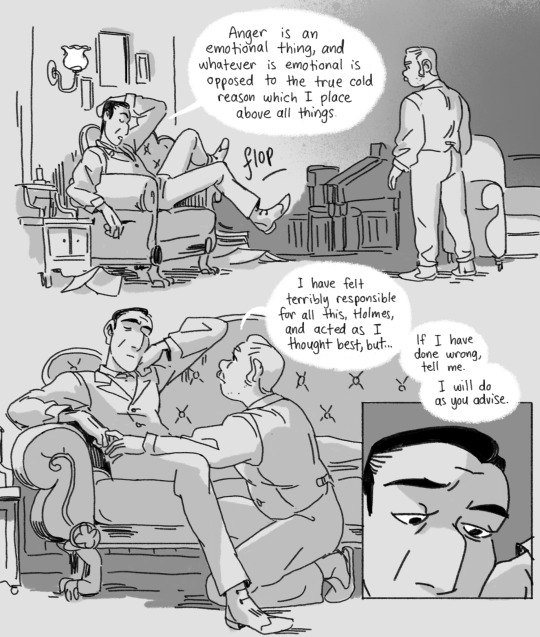
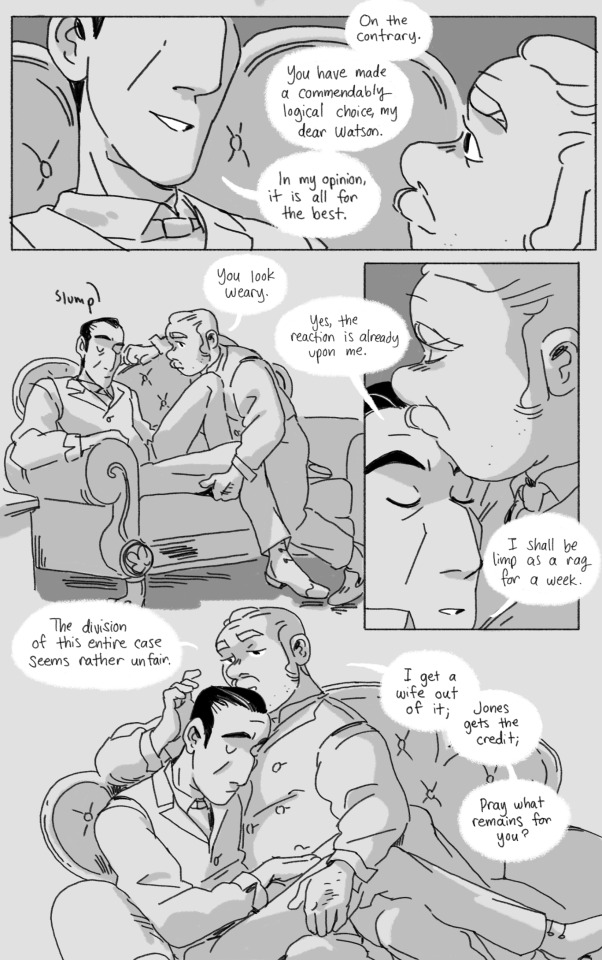
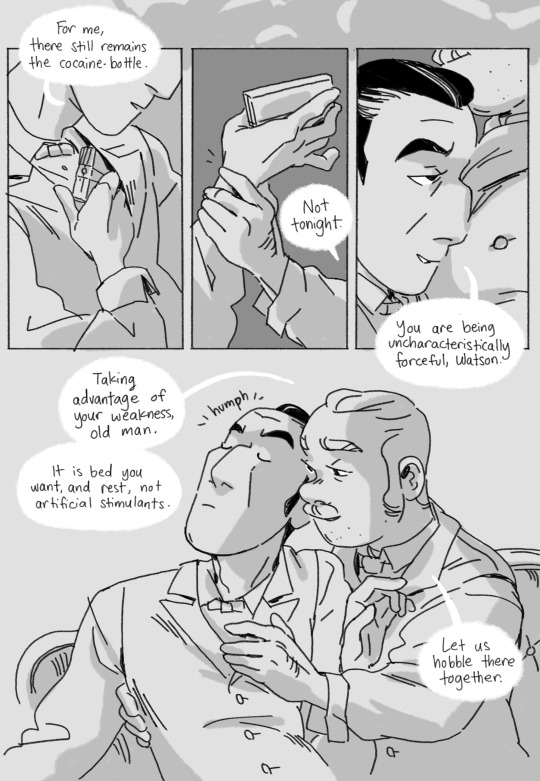
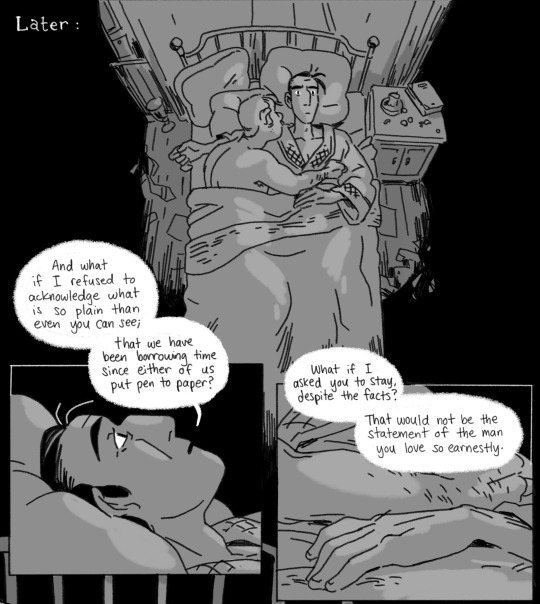
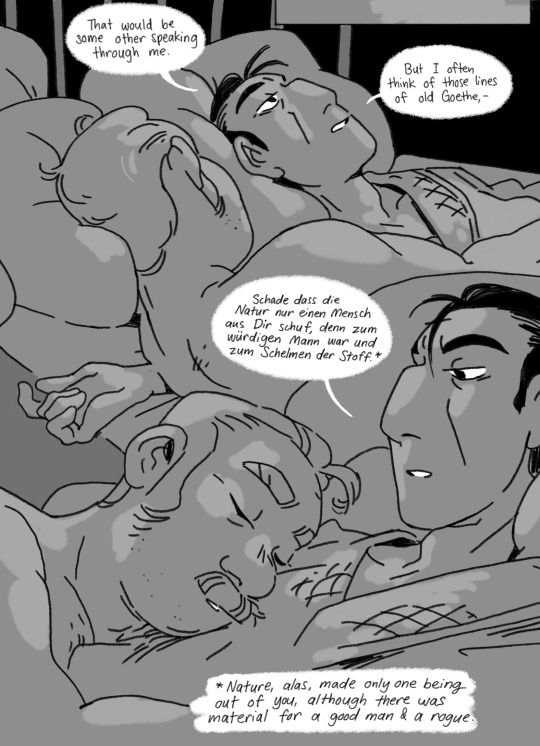
Part 7, the final comic in my SIGN OF THE FOUR chapter. (Part one), (part two), (part three), (part four), (part five), (part six).
The context for this conversation is: Holmes has had no work from Scotland Yard due to rumors about his and Watson's relationship. He responded to this with excessive cocaine use and then working himself unhealthy on the one case that came along; Mary Morstan's. Meanwhile, Watson befriended Mary, who is also gay, and realized that a lavender marriage with her could make him and Holmes safe, as well as granting her more freedom. Watson has not yet told Holmes of his decision.
(This is part of the Watsons sketchbook series!)
canon scene under the cut, which is achingly poignant in its own right:
“Well, and there is the end of our little drama,” I remarked, after we had set some time smoking in silence. “I fear that it may be the last investigation in which I shall have the chance of studying your methods. Miss Morstan has done me the honour to accept me as a husband in prospective.”
He gave a most dismal groan. “I feared as much,” said he. “I really cannot congratulate you.”
I was a little hurt. “Have you any reason to be dissatisfied with my choice?” I asked.
“Not at all. I think she is one of the most charming young ladies I ever met, and might have been most useful in such work as we have been doing. She had a decided genius that way: witness the way in which she preserved that Agra plan from all the other papers of her father. But love is an emotional thing, and whatever is emotional is opposed to that true cold reason which I place above all things. I should never marry myself, lest I bias my judgment.”
“I trust,” said I, laughing, “that my judgment may survive the ordeal. But you look weary.”
“Yes, the reaction is already upon me. I shall be as limp as a rag for a week.”
“Strange,” said I, “how terms of what in another man I should call laziness alternate with your fits of splendid energy and vigour.”
“Yes,” he answered, “there are in me the makings of a very fine loafer and also of a pretty spry sort of fellow. I often think of those lines of old Goethe,—
Schade dass die Natur nur einen Mensch aus Dir schuf,
Denn zum würdigen Mann war und zum Schelmen der Stoff.
“By the way, à propos of this Norwood business, you see that they had, as I surmised, a confederate in the house, who could be none other than Lal Rao, the butler: so Jones actually has the undivided honour of having caught one fish in his great haul.”
“The division seems rather unfair,” I remarked. “You have done all the work in this business. I get a wife out of it, Jones gets the credit, pray what remains for you?”
“For me,” said Sherlock Holmes, “there still remains the cocaine-bottle.” And he stretched his long white hand up for it.
2K notes
·
View notes
Text
Today's chapter is in so many ways the culmination of the book. There is only a single brief hint of Griffin as a person:
They stood on the landing, Kemp speaking swiftly, the grotesque swathings of Griffin still on his arm.
But the reminder isn't so much that he's a person, naked and scared as much as he is angry. The mention of his bandages here isn't focused on him being injured, and now no longer receiving any treatment. Instead, they're called 'grotesque', the focus is on them being disgusting. The fact that Kemp has them means that the Invisible Man can no longer be seen, that is all. And while the narration doesn't mention Kemp casting off these wrappings from his own arm, I certainly get the impression that he does. Certainly he metaphorically does, when he immediately begins to assert:
“He is mad,” said Kemp; “inhuman. He is pure selfishness. He thinks of nothing but his own advantage, his own safety. I have listened to such a story this morning of brutal self-seeking…. He has wounded men. He will kill them unless we can prevent him. He will create a panic. Nothing can stop him. He is going out now—furious!”
Mad. Selfish. Furious. Will kill, will cause panic. Inhuman.
All those descriptors could be used for a person, except the last. Still a dangerous person of course, but a fellow human being. But Kemp denies Griffin that. As he continues to talk with the police, it becomes clear that in all his listening to Griffin's tale, the only things that have stuck are the bad parts. We knew that often when Griffin was at his most open/vulnerable, Kemp was distracted. The narration outright told us so. But he demonstrates that he was alert to all the things that confirmed his own fears... and even when he did hear the other stuff, it wasn't pity or understanding that he took from it.
He knows that Griffin wanted to get away. He knows Griffin wants his books back. He doesn't think about how that was originally in a desire to become visible again.
He knows Griffin has hurt people before. He knows Griffin said he wants to kill, to start a Reign of Terror. He doesn't consider how Griffin said it was a necessity rather than a desire, doesn't consider the many times he tried to avoid harming others until forced into a confrontation or overcome by anger.
He knows all of Griffin's weaknesses. He knows that in the past Griffin has been exhausted, starving, cold, sick, unsheltered, hunted by dogs. He tries to recreate all these worst moments.
He knows Griffin is more visible in certain situations. Rather than suggesting people start carrying mud or paint around to try and mark him, or that they use smoke or colored powder in the air, he goes straight to the most vicious option: powdered glass. The one that Griffin himself mentioned.
In every way, he is turning all that Griffin told him into a weapon he can wield against him. And to a certain extent, it could simply be precaution. It is hard to fight against an invisible foe - more specifically to find one or to defend against one that you don't know is there. That does indeed require strategic thinking if you want to ensure success.
But Kemp dives right past strategy into cruelty. He goes to the greatest extremes immediately, proposes ideas that would never be put into use against another person. The powdered glass is case in point. Not only could other less violent options come to mind if he'd spent some time thinking about it, but there's a reason he hesitates before suggesting it.
“It’s cruel, I know. But think of what he may do!”
That sums it up, doesn't it? Yes, the method is cruel. But the ends are worth the means, because the consequences would be... Well, the idea of the consequences is too frightening. There's nothing he'll put past Griffin now. Because, as he says next:
“The man’s become inhuman, I tell you,” said Kemp. “I am as sure he will establish a reign of terror—so soon as he has got over the emotions of this escape—as I am sure I am talking to you. Our only chance is to be ahead. He has cut himself off from his kind. His blood be upon his own head.”
Kemp is utterly convinced that Griffin is a monster now. What's more, he considers it something that Griffin has done to himself. And while in many ways, both literal and symbolically, there is some truth to that... it doesn't have to be so final. Even if he has cut himself off from his own kind, that doesn't have to be a permanent state of being. He is still a man, he's never stopped being human this whole time.
But Kemp doesn't think that's true. And so in the end of the chapter he blames Griffin. For all that has happened: what he's done and what others have done to him in result. For all that will happen: for what he might do and what others will do to him first to try and stop that. It's Griffin's fault, all of it, and because Griffin did something inhuman first, that justifies all lack of humanity in hunting him down.
Hunting him. Like a dangerous animal.
21 notes
·
View notes
Text
Another thing I didn't mention the other week that kills me about 'The Plan That Failed' is the way Griffin's name is used. This is following up on a pattern I noticed a little bit ago, but... in a really sad way.
So, Kemp never calls Griffin by name. When they first met, he repeated the name back in confusion, but never actually acknowledged aloud that the person he is talking to is the Griffin he vaguely remembers. Or at least, while he does so by implication, he doesn't do so by name:
“Griffin,” answered the Voice. A younger student than you were, almost an albino, six feet high, and broad, with a pink and white face and red eyes, who won the medal for chemistry.”
“I am confused,” said Kemp. “My brain is rioting. What has this to do with Griffin?”
“I am Griffin.”
Kemp thought. “It’s horrible,” he said. “But what devilry must happen to make a man invisible?”
Kemp goes right to the concept of 'a man becoming invisible' rather than lingering in any way on 'so you are Griffin'. And in the moment, that sort of makes sense. Apparently he barely remembers Griffin from school (if at all), and so there's no particular shock of recognition for him. It's more shock at what's going on. But then after that, a distinct pattern begins to emerge, where Kemp only calls him by name when he's being vulnerable/civilized. When he is afraid of Griffin's violence, or thinking of him as something monstrous, he calls him by some kind of title, usually 'The Invisible Man'. And it's rare for Griffin to get his name used at all.
But even all of that was still just in the narration. Of course, the way this book is written as a sort of adaptation of various peoples' stories of what they remember may mean none of the dialogue has to be taken as exact. But still, even in that case it's notable that not once does Kemp call Griffin by any sort of name out loud. That whole pattern I've been discussing is only in his narration. At no point in any of their dialogue does he call him Invisible Man, but he also never calls him Griffin. The only way he addresses him directly, ever is "you." In contrast, Griffin says "Kemp" to him quite often.
So there's a distinct imbalance there too. Griffin is confiding his past, giving vent to his emotions, hoping for understanding and using Kemp's name often as an interjection which affirms a connection between the two of them. Meanwhile Kemp is walking a fine line verbally between outright either acknowledging Griffin's humanity (by using his name) or totally denying it (by directly addressing him with a title). This of course reflects his thoughts and also his actions, as he's listening to Griffin's story but in large part only to buy time so he can be caught.
But then... that changes.
Kemp’s hand went to his moustache. Was that a movement downstairs?
“And it is killing we must do, Kemp.”
“It is killing we must do,” repeated Kemp. “I’m listening to your plan, Griffin, but I’m not agreeing, mind. Why killing?”
[...]
“Humph!” said Kemp, no longer listening to Griffin but to the sound of his front door opening and closing.
“It seems to me, Griffin,” he said, to cover his wandering attention, “that your confederate would be in a difficult position.”
“No one would know he was a confederate,” said the Invisible Man, eagerly. And then suddenly, “Hush! What’s that downstairs?”
“Nothing,” said Kemp, and suddenly began to speak loud and fast. “I don’t agree to this, Griffin,” he said. “Understand me, I don’t agree to this. Why dream of playing a game against the race? How can you hope to gain happiness? Don’t be a lone wolf. Publish your results; take the world—take the nation at least—into your confidence. Think what you might do with a million helpers—”
Suddenly we get Kemp calling Griffin by his name, out loud, several times in rapid-fire. At first, I noticed this particularly because the first time he does so is right after Griffin proclaims that they will need to kill people. Also, every single time he says it, it's paired with his own doubts/refusal to agree to this plan. But while that is all true, it's not the most significant detail here. More salient, I think, is the way that every use of Griffin's name is immediately preceded by mention of people arriving to capture him.
When Kemp finally calls Griffin by name, it's done in a clear attempt to distract him. The only time he grants him the courtesy of reaching out to him as a fellow human in this way is a lie. He's trying to use that connection in order to trick Griffin. He's essentially treating Griffin's name (which after the pattern in narration seems so clearly to me to be essentially shorthand for his humanity) as a tool to arrest him.
Honestly, this entire situation is pretty messed up all around. It's hard to say that either Marvel or Kemp ever really 'betray' Griffin, because they were never given even footing with him in the first place. They certainly didn't choose to help him, they both felt coerced. And yet, this moment... really does feel like a betrayal. It feels cruel, somehow adds insult to injury.
Kemp has been teetering between considering/treating Griffin as a fellow human, or the Invisible Man a monster. Certainly, the scales have been tipping steadily towards the latter, but it's not until this moment that everything comes crashing down. And it feels like such a bitter extra sting of irony that when it does happen, when the moment comes, he calls him by name.
But he's committed to the opposite course.
10 notes
·
View notes
Text
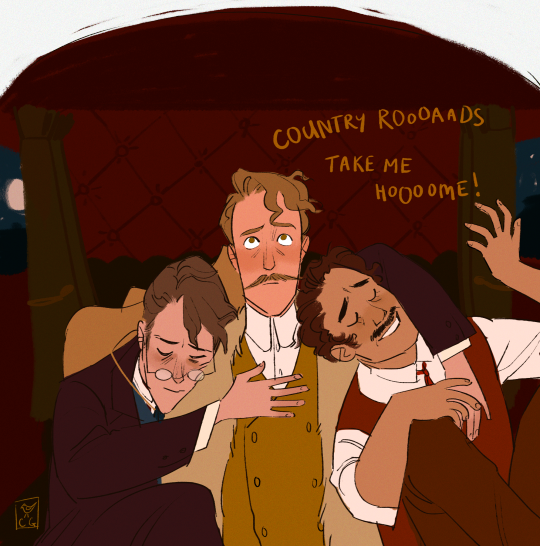
hey, don't cry. night of the 26th may, ok?
4K notes
·
View notes

